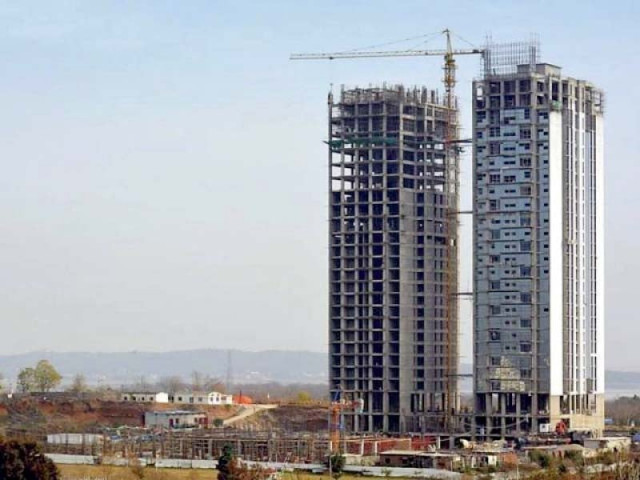Court summons FBR chief in tax case
Finds legal issues in imposing 20% deemed income tax on real estate

The Lahore High Court (LHC) on Tuesday summoned the Federal Board of Revenue (FBR) chairman in a case of imposing 20% deemed income tax on the real estate sector as it found legal and constitutional issues in implementing the major tax measure.
A single-bench of the provincial court issued a short order the day FBR Chairman Asim Ahmad told a parliamentary committee that a contraction in imports could compromise revenues in the months ahead.
The chairman’s statement underscores the multiple challenges that have turned current fiscal year’s tax target of Rs7.470 trillion unrealistic.
“Let Chairman FBR and Federal Secretary Ministry of Law and Justice appear on 17.11.2022 to answer hardship, ibid, and assist the court, about rationale behind omitting Section 7 from Finance Act 1989 after 18th Amendment in Constitution and taxation of immovable property as deemed income and Entry 47, instead of Entry 50, of the Constitution,” read the LHC’s short order.
The real estate sector has filed petitions against Section 7E introduced to impose taxes on those people who derive income equal to 5% of the fair market value of capital assets situated in Pakistan, who will be charged 20% tax.
However, Section 7E faces serious constitutional challenges as many argue that the government may find it difficult to defend the legal provision in courts that falls within the purview of provincial taxation under the constitution.
The LHC wrote in its interim order that Section 7E taxation has been done on the basis of “speculative value of the property”, which appears to be in contradiction to Section 116 that deals with the wealth statement being submitted by a taxpayer along with the tax return.
“In this court’s opinion, the declaration under Section 116 becomes part of deemed assessment order under Section 120. If argument of learned additional attorney general is accepted as submitted, the court after reading down the deemed provision will have to look into conflict between Section 116 and 7E,” said the interim order.
“The court is not convinced with the arguments that this being a procedural matter cannot be looked into. If this court attempts to reconcile both the sections, the yardstick of fair market value being speculative and in conflict with the accepted declaration under Section 116 will be a hurdle,” the court wrote.
The LHC single-judge bench stated that if the court eventually attempts to read down the number of clauses in Section 7E, the same would amount to rewriting of the impugned provision.
Petitioners were of the view that Section 7E was in violation of the constitution and introduced in haste without determining the procedure for taxation.
The additional attorney general submitted before the court that based on the principle of interpretation, the court should strive hard to save legislation and the impugned provision could be read down to harmonise it with the competence available under Entry 50.
He reiterated that the actual incidence of taxation was 5% of the fair market value of a capital asset and the term asset included immovable property. However, the court appeared to have not accepted his argument, suggested the short note.
The FBR now faces a gigantic task of collecting Rs965 billion in taxes in December, which it has set on the assumption that new taxes in the budget will help fetch around Rs200 billion in the month. Sources said that serious legal challenges had put a question mark over realising the Rs965 billion monthly target, particularly at a time when Pakistan was under pressure from the International Monetary Fund (IMF) to impose more taxes.
The government has not ruled out a mini-budget in private discussions but the FBR has not yet endorsed it publicly.
Meanwhile, in a meeting of the National Assembly Standing Committee on Finance, the FBR chairman stated that a steep reduction in imports was undermining the FBR’s revenue efforts.
Asim Ahmad said that due to the fall in imports, the revenue collection had been affected that, in coming months, might put pressure on domestic taxes as well.
Imports fell by 17% in October and they might fall by 20% in the current month, he said, adding that the FBR was not considering any new proposal.
Ahmad declared that the FBR would try to cover any revenue shortfall in the coming months with administrative measures. So far, Rs15 billion has been generated through administrative measures against Rs5 billion in the same period of last fiscal year.
However, sources said that the IMF had traditionally been against relying on the administrative measures and had always asked for filling the revenue gap with new taxes.
The FBR chairman revealed that nearly 2.6 million income tax returns had been submitted in the current fiscal year, a sharp fall of 1.2 million, or nearly 32%, over the previous year.
He pointed out that Rs56 billion had been paid in taxes along with the returns in the current year against Rs52 billion in the last fiscal year. One lakh new taxpayers filed returns in the fiscal year.
Published in The Express Tribune, November 16th, 2022.
Like Business on Facebook, follow @TribuneBiz on Twitter to stay informed and join in the conversation.


















COMMENTS
Comments are moderated and generally will be posted if they are on-topic and not abusive.
For more information, please see our Comments FAQ